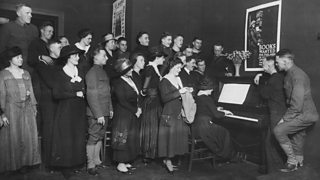
In Radio 3’s two week season Music in the Great War from 23 June – 6 July we are following the story of World War One through the music and culture of the time and considering the immediate and wider impact of the war on the international classical music world.
The Western music world in 1914 was an international arts scene with soloists, conductors and composers criss-crossing the globe: Rachmaninov performing in the USA, British composers studying in Germany, Stravinsky, Diaghilev and the Ballets Russes in Paris, Wagner revered in opera houses worldwide, and Viennese operettas attracting Μύaudiences in theatres in Russia, the USA and Britain. In August 1914 this came to an end.
As lead producer for the season my role has been to research and co-ordinate the music being played across the two weeks.Μύ It has been interesting to reflect on the effects of increased nationalism in all warring countries: how initially in 1914 there were increased calls to play only music from allied nations. French opera disappeared from the stages of Berlin; Wagner disappeared from Moscow and St Petersburg; German musicians were expelled from the American orchestras, who until that time had drawn heavily on musicians of German origin; British musicians discussed whether or not to boycott German music and how to nurture British music. Our series consultant, Dr Kate Kennedy, drew my attention to the debate raging in London via the Musical Times journal from 1914, while the archivists of the professional orchestras in New York, Boston, Berlin and Vienna have been helpful in providing information about concert life in those cities in the war years.
I've been discovering the stories of musicians unwittingly caught up in the wrong place at the wrong time: British and Canadian citizens in Germany who, in August 1914, were rounded up and interned at Ruhleben racecourse outside Berlin, and similarly men of German and Austian heritage interned in London at Alexandra Palace.Μύ The British Library and the Imperial War Museum hold moving accounts of their frustrations and determination to try and stay motivated, and in each internment camp they created an orchestra that gave concerts for all internees. We're recreating some of the music heard in these extraordinary circumstances in a concert given by the Βι¶ΉΤΌΕΔ Concert Orchestra on 26 June, with the actor Alex Wyndham (from the Βι¶ΉΤΌΕΔ series The Crimson Field).
I've also been rediscovering music by long forgotten names who are part of the lost generation: British and Australian composers William Denis Browne, FS Kelly and Ernest Farrar, and the German, Rudi Stephan. I find that hearing their music is a vivid reminder of them as individuals. We have no recorded interviews with these people, but instead we can bring them back to the present through their music.Μύ It is impossible to guess the directions their careers would have taken, which in itself is a poignant reminder of the lost potential from these artists.
It’s these personal tragedies that I have found the most moving, particularly when listening to some of the heartfelt music written by those whose family members died, including Arthur Bliss who lost his clarinettist brother Kennard, and Louis Vierne whose 18-year-old son and his brother Rene, also a musician, both died.Μύ
One of the highlights of the season will be a concert on 28 June, when the Vienna Philharmonic performs on this historically significant day, 100 years after the assassination of Austro-Hungarian Archduke Franz Ferdinand, in Sarajevo together with a choir from Sarajevo.Μύ This collaborative event is being held as a concert for peace and reconciliation.
In taking this journey of rediscovery of music in the Great War, through individual stories and broader reflection, I hope that listeners can hear for themselves the impact of the war on music and culture world-wide.
Janet Tuppen is Lead Producer, WW1 Season, Βι¶ΉΤΌΕΔ Radio 3
Μύ
- Read also, ;
- ;
- ;
- And
- See the and read about on the Media Centre
Μύ
